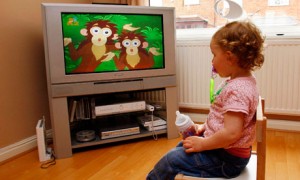The Impact of Media; particularly on children
By Joshua Aaron Karber
Any scholar, academic, philosopher and even politician can tell you that in our society today we are literally bombarded with images and information, and at a level that is unparalleled throughout documented history. Essentially, we are all jacked in to a system of words, pictures, sounds, videos and symbols that create a representational world, one where we are not only socialized but raised by society to understand and obey them. The truth is that we can’t escape it.
From birth, we are taught that the golden arches mean McDonalds, that Calvin Klein is cool, and that the American flag stands for freedom. Strictly speaking, the Wachovski brothers’ movie The Matrix is not too distant a vision from the world we live in today.
In particular, the impact media has on the psychosocial development of children is quite astonishing. It is becoming more and more important for doctors to discuss with parents what, when, and how much media their children are exposed to on a daily basis. This includes ALL media, spanning from television to music, and from video games to, of course, the internet.
For the sake of clarity, I am going to focus this blog on three main topics: learning, violence, and sexuality.
LEARNING
Media can be a powerful teacher. For instance, Sesame Street is a good example of how toddlers can become versed in valuable lessons on racial harmony, kindness, simple math, the alphabet, and cooperation through an education television format. This is a good illustration of how media can be of beneficial value to kids. Especially in some disadvantaged settings, healthy television habits can actually be a positive teaching tool.
However, watching TV can still do detrimental things to kids such as take time away from schoolwork and reading. Many researchers believe that a large number of daily, unsupervised television viewing by elementary school children can have severe and pernicious effects on academic performance, and particularly reading. Although the exact statistic is uncertain, it is estimated that most 8-10 year-olds know more about The Simpsons or South Park than they do about any of the U.S. presidents. Is this a good thing?
Moving on…
VIOLENCE
Most researchers agree that the amount of violence on television is on the rise. According to reputable statistics, the average child sees more than 12,000 violent acts on television yearly, not excluding rape or murder, and more than 1000 studies confirm that exposure to heavy doses of television can increase aggressive behavior, most commonly in boys. These same studies also link newspaper or television publicity of suicides to an increase in suicide risk. Many sources conclude that minorities, emotionally disturbed children, children with learning disabilities, and children in distressed families are more vulnerable to acts of violence on television. Doesn’t that sound like a large portion of American kids?

Again, moving on…
SEXUALITY
Today, TV has become one of the leading sex educators in the United States. News sources report that between 1976 and 1996 there has been an almost 300% increase in sexual interactions during the family hour of 8 o’clock to 9 o’clock. The unavoidable fact of the matter is that television can expose children to sexual situations as common and risk-free, delivering and hammering home the message that these situations are okay because “everyone does it.”
Furthermore, studies show that sexual activities between unmarried partners are portrayed 24 times more than sex between spouses, while unwanted pregnancies and STD’s are rarely mentioned. Additionally, teens score the media as a leading source of info/knowledge on sex, a distant second to school sex education programs. Many people do believe that the media can influence sexual responsibility by promoting positive sexual content on topics such as birth control and monogamy. However, no empirical evidence supports this concept. So the final question we are lead to is: who (or what) is teaching our kids about sex?
And finally…
OUR CONCLUSION
In a society that is so dependent and deep-rooted in media, one must ponder the consequences and ramifications that TV, radio, video games, and the internet can have on our kids, and on each other. Does watching violence provoke violence? Do sexual situations inspire sexuality? And does the portrayal of drug use/smoking/consumption of alcohol teach kids the wrong things? No one really knows. But, people should consider one last thing before making a decision: are our children’s mental, emotional and physical health really worth the risk?
I think so. Don’t you?
– Naked Raygun



Leave a response